In another mission to the ISS, SpaceX Crew Dragon will be bringing supplies and new science experiments to the International Space Station later this month. In a video released, NASA shares which researchers will be heading out into space.
Bioprint FirstAid

One of the researchers heading out into space, according to NASA, is a science gear handheld bioprinter that uses the patient's skin cells to create tissue-forming patches to cover wounds and lacerations, accelerating the healing process significantly. The technology has proven effective and can regenerate skin injuries quickly, even in space, though it can also be used on land.
A study published by the German Space Agency, Bioprint FirstAid, demonstrates how the new portable bioprinter can be used and its application for future missions on Mars and the Moon. Bioprinting, according to NASA, could customize patches that help address healing challenges that may occur in space and could complicate treatment. Extending a person's cells before missions would enable a more immediate response.
ALSO READ : Zero-Gravity Vegetable Garden Aboard the ISS Boosts Morale and Steady Food Supply for Astronauts
Delivery of Cancer Drugs
Merck, a pharmaceutical company, is continuing a study on protein crystal growth that may result in significantly more affordable and convenient ways of delivering cancer treatment drives via infections rather than intravenously in common clinical settings.
Monoclonal antibodies used in a vast range of human diseases don't dissolve easily in liquors and are typically given via IV. Treatments given via injection could be more accessible and functional. CASIS PCG 20 continues to cork on crystallizing monoclonal antibodies as the active ingredient in drugs that target multiple cancer cells.
Assessing Risks of Infection
Scientists have observed that spaceflight may increase the virulence of potentially harmful microbes that can reduce human immune function and could increase the risks of infections and diseases. Host Pathogens assess space-induced changes in a person's immune status by culturing cells collected from the ISS crew before, during, and after their spaceflight with both bacteria grown under simulated spaceflight and unaltered bacteria. Researchers are hopeful that the results could help assess the risks infectious microbes may pose and how to support the development of countermeasures can continue.
Space Laundromats
As of now, astronauts aboard the space station wear clothing items several times, replaced when new clothing deliveries and resupply missions are done. Limited cargo space aboard the ISS makes this a challenge, and resupply is not an option for more extended missions such as for Mars and the Mood. Procter & Gamble has developed a Tide Infinity, fully degradable energy specifically used in space. Studies of its performance in stain removal, formulation, and microgravity will be conducted in the upcoming mission.
Once the new technology has been proven effective in space, Tide will use its cleaning methods and advancements for sustainable, low-resource-use laundry solutions on the planet. The experiment has been sponsored by the International Space Station National Library.
RELATED ARTICLE : Lunar Base, the Logical Next Step for Humans Says Elon Musk
Check out more news and information on NASA Missions in Science Times.
© 2026 ScienceTimes.com All rights reserved. Do not reproduce without permission. The window to the world of Science Times.












